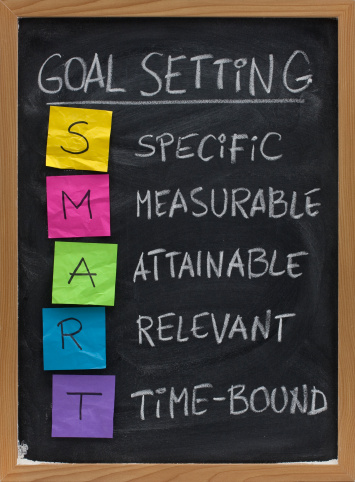Have you ever set a goal that you did not achieve? If so, don’t be discouraged. Try this quick and easy method for setting goals that will lead you to success!
Let’s say your original goal is, “I will get good grades in school”. This goal is too general, which will make it very difficult to assess whether or not you achieved your goal. Instead, get specific and change your goal to a SMART goal. Remember, this example below applies to school; however, this technique can apply to any goal for work and/or your personal life. Here is how you can change your goal using the SMART method.
Your goal should be……
SPECIFIC – It will be easier for you to work on your goal if you have specified what you will be doing to help you achieve it.
e.g., “I will achieve good grades in my Psychology course by using active study strategies”
MEASURABLE – Make sure you can measure your progress so you can see how close you are to achieving your goal.
e.g., “I will achieve above 80% on all my Psychology exams by using active study strategies”
ACHIEVABLE – An achievable goal is one that is in line with your specific abilities and that considers additional ways to help you achieve your goal. Incorporating support from professionals, family, or friends is always a good idea.
e.g.,” I will get above 80% on all my exams by using the active study strategies and weekly reviewing with my tutor and using past exams to test my knowledge”
REALISTIC – If you set goals that are not realistic, then you are likely setting yourself up for failure. Always make sure your goals are realistic.
e.g.,” I will achieve an 80% in my Psychology class overall by using the active study strategies, reviewing with my tutor and checking my knowledge using past exams”
TIMELY – It is important to set a time frame for your goal to keep you on track. Without a time frame, your goal can drag on for too long. Once the time frame is completed, you can assess your performance and make adjustments or new goals as needed.
e.g.,” I will get 80% in my Psychology class over the next semester”
By Stefanie Haws
Speech-Language Pathologist at Simone Friedman Speech-Language Services



